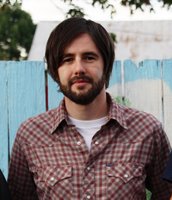
Andrew McAllister, writer/director, URBAN SCARECROW
Andrew McAllister is a Seattle-based freelance director and editor, most recently producing spots for the Seattle Seahawks and editing a documentary on Evel Knievel for the History Channel. His first feature, "Shag Carpet Sunset," netted enthusiastic reviews, toured the festival circuit (Seattle, Austin, Edmonton among others) and secured distribution through Eclectic DVD. He is currently editing the feature "Crossing Paths," starring Minnie Driver and Jeremy Renner.
How did the initial idea for this story come about?
I was in junior high, my dad was running a bike shop on a busy little road known as Old Highway 99 in Seattle. There was a healthy stretch of 99 that was sort of no man's land -- somewhere between city and suburb. Strip malls were next to strip clubs, there were gravestone merchants, palm readers, mini-golf and of course the motel culture. My first memory of driving down 99 was as the sun began to drop. As we drifted down the road in our red, wood-paneled station wagon, it seemed as if the "no" on every "no vacancy" sign lit up just as we passed by. I remember as a kid seeing families settling in these motels and just feeling like I had discovered this amazing world. I hated where I lived and wanted to live in the motels with the families. So that feeling always stuck with me and I always wanted to make a film about it.
Describe the process of getting it from a written script to production.
It was a scripted production. But I knew two of the main characters, Wes and Derek, were going to be played by teenagers. Peter Richards was 16, he came from a theater background, very devoted and very driven. So it was good, from time to time he'd kind of smile when he looked at some line of dialogue I had written. And I got that he wasn't into it. So we'd rework until it sounded natural. Ben Garman was 19, a completely funny kid, and we just reworked certain scenes so he could get rolling, be in his zone. The things he did were much more spontaneous and interesting than the "spontaneous and interesting" things that were on the page.
What are some scenes or moods in other films that have made an impression on you?
I definitely loved Midnight Cowboy and My Own Private Idaho. I loved the feeling of those films. And a film called Fat City -- that's one of my favorites. I loved those characters, their will and their environment. There's also a comic edge to the film in which I tried to channel the "loose canon" element of Steve Martin's early stand-up comedy and The Jerk.
Any memorable moments during filming?
There was a significant bust in front of the motel we were shooting at. A couple was pulled over and they tried to run from their car, but they were instantly surrounded by about six cop cars. The officers had their shotguns out, screaming. Other than that, everyone living and working at the motel was very friendly and kind.
Has the finished product caused you to see what you wrote in a different way?
Absolutely. The kind of films I like to watch are inherently imperfect. There's a off-kilter quality to them, and I think you can't fight what you're ultimately drawn to. The script is so important in terms of building a team, wrangling confidence, and creating a through line. But once you start putting humans around a camera, you can never ignore what they're bringing to the production. And most of the time, what they have to offer always seems to throw off the preconceived ideas in your head. And I think in the end it makes the production more specific and, if you're lucky, more interesting.
The narrative feature URBAN SCARECROW will be screened at 9:30 pm on Thursday, Oct. 19, and at 5 pm on Sunday, Oct. 22. Film passes to the Austin Film Festival are just $35 for admission to all screenings (space permitting).



No comments:
Post a Comment